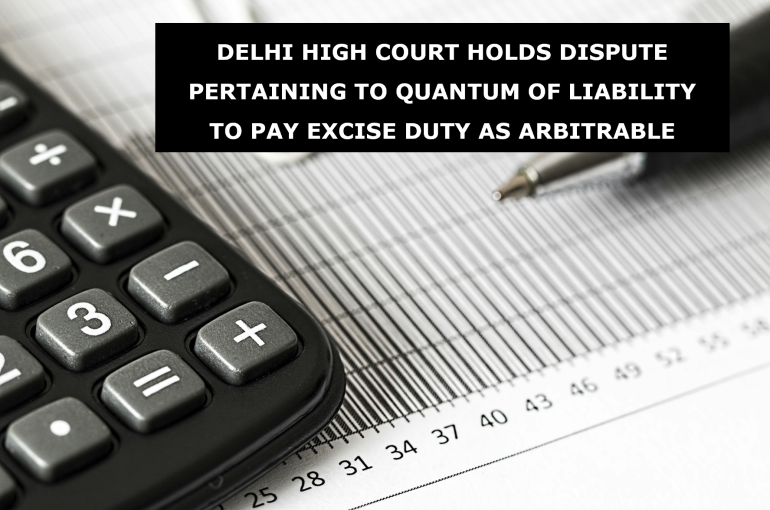DELHI HIGH COURT HOLDS DISPUTE PERTAINING TO QUANTUM OF LIABILITY TO PAY EXCISE DUTY AS ARBITRABLE
The Hon’ble Delhi High Court Bench comprising of Justice Prateek Jalan passed a Judgment dated 22-08-2024 in the matter of Bharat Broadband Network Ltd. Vs Paramount Communications Ltd. O.M.P. (COMM) 355/2024 and observed that the dispute between the Parties as to the quantum of liability towards excise duty is arbitrable, as the same pertains to a dispute purely between two commercial entities and not an adjudication in rem.
Facts
(i) In the present case, the Petitioner, Bharat Broadband Network Ltd. issued a Notice Inviting Tender dated 03-04-2013 for supply of optical fibre cable of certain specifications and accessories for various parts of the country.
(ii) The Respondent- Paramount Communications Ltd. submitted its bid for the North-West India Package (Package A) and the East and North-East India Package (Package F).
(iii) Thereafter, Advance Purchase Orders were issued on 28-01-2024 for Package A for a sum of Rs. 119 Crores and for Package F for a sum of Rs. 187 Crores. Subsequently, the Purchase Orders were amended and re-issued on 25-03-2014 for Package A for a sum of Rs. 30 Crores and for Package F for a sum of Rs. 71 Crores.
(iv) The dispute that arose between the Parties pertained to excise duty payable on the goods to be supplied for Package A and Package F regions. The Respondent raised the Invoices based on the classification of goods adopted by the Excise Department i.e. under Customs and Excise Tariff Head No. 90011000, which attracted 12.36% rate of excise duty. However, the said classification was different from the Petitioner’s classification of goods i.e. under Customs and Excise Tariff Head No. 85447090, which attracted 10.30% rate of excise duty.
(v) The Petitioner did not amend the Purchase Orders as per Respondent’s Invoices. Even otherwise, the Petitioner only partly paid the Invoice amount.
(vi) There were other disputes as well regarding difference in central sales tax and other deductions made by the Petitioner.
(vii) Thus, the Respondent initiated arbitration and the Petitioner resisted the claims of the Respondent on the ground that as per the Notice Inviting Tender, the price would remain fixed, hence, it is not bound to pay revised invoice prices and that disputes pertaining to excise duty are not arbitrable.
(viii) The Ld. Arbitrator passed an Award dated 20-05-2024 and partly allowed the Respondent’s claims to the extent related to excise duty on the ground that excise duty differential is arbitrable as the dispute is between two commercial entities, and not an adjudication in rem and as per the terms of the Notice Inviting Tender, price change / revision falls within the scope of ‘change’ in tax. As a result, the Arbitrator awarded Rs. 51,10,050/- (Rupees Fifty-One Lakhs Ten Thousand and Fifty only) for Package A and Rs. 1,19,66,589/- (Rupees One Crore Nineteen Lakhs Sixty-Six Thousand Five Hundred and Eighty-Nine only) along with interest thereupon at 9% per annum.
Delhi High Court Observations
Aggrieved by the Arbitral Award dated 20-05-2024, the Petitioner filed an Application under Section 34 of the Arbitration and Conciliation Act 1996 (Application for setting aside arbitral awards) before the Hon’ble Delhi High Court. The High Court passed a Judgment dated 22-08-2024 and observed as follows:
(1) That in the event the dispute would have been pertaining to the liability to pay tax, it would have been a sovereign function of the State, making the dispute inarbitrable. However, the issue in the present case related to two commercial entities who had inter se disputes regarding proper classification of goods and that whether the Petitioner was liable to pay to the Respondent the price of the goods supplied, along with excise duty at the rate stipulated in the Invoices. Hence, such disputes are capable of being resolved by arbitration.
(2) That further, the Arbitrator has rightly relied on the terms of the Notice Inviting Tender, which permitted revision of prices, in the event there was a change in taxes / duties. Hence, the Petitioner would be bound to pay the Invoices as per the revised prices.
(3) That as per the specifications of the goods and the classification of goods under Customs and Excise Tariff Head, the Arbitrator rightly concluded that the appropriate Tariff Head would be 90011000 i.e. Optical fibers and optical fiber bundles; optical fiber cables other than those of heading 8544; sheets and plates of polarising material; lenses (including contact lenses), prisms, mirrors and other optical elements, of any material, unmounted, other than such elements of glass not optically worked. In fact, the Excise Department demanded excise duty to be paid at 12.36%, which was informed by the Respondent to the Petitioner but the Petitioner failed to meet such demand. Therefore, the Petitioner would be bound to pay the Invoices as per the excise duty stipulated by the Excise Department.
(4) Accordingly, the Arbitrator correctly exercised its jurisdiction to determine inter se disputes between the Parties as to the quantum of liability of payment of excise duty.
(5) As a result, the High Court observed as follows regarding the arbitrability of disputes:
“The assessment of evidence, and weight to be attached thereto, are ordinarily matters within the domain of the arbitral tribunal, which in the present case, has come to entirely reasonable and justifiable conclusions.”
Conclusion
Thus, based on the aforesaid observations, the High Court Bench upheld the Arbitral Award dated 20-05-2024, as it did not contain any patent errors that went to the root of the matter and as the Arbitrator dealt with all documentary evidence placed before him, before passing the Award. Hence, as the Award did not fall within the parameters provided in Section 34 of the Arbitration and Conciliation Act 1996, the High Court dismissed the Section 34 Petition challenging the Arbitral Award.
Harini Daliparthy
Lead Senior Associate
The Indian Lawyer





































Leave a Reply